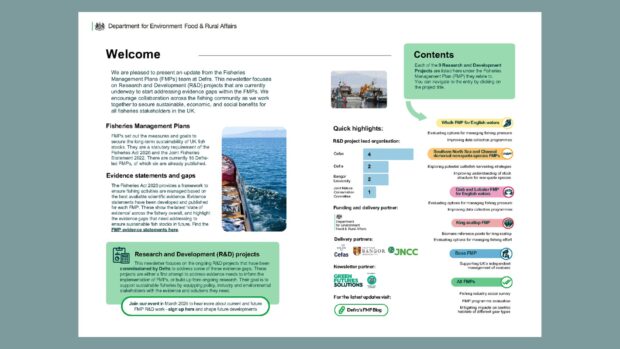
In our introduction to evidence and fisheries management plans (FMPs), blog post we talked about taking an evidence-based approach to developing our plans and identifying where there are gaps in evidence.
Last year, we commissioned six Research and Development (R&D) projects to start addressing some of these gaps and are pleased to share our recently published newsletter which gives updates on some of this exciting research.
You’ll find updates on some of these projects, as well as some longer-term research which contributes to all the published FMPs, alongside key facts and context, scope, timeframes and expected outcomes.
Read it here: Fisheries Management Plans Research and Development projects newsletter
This collaborative programme of work brought together policy makers, industry representatives, and academic researchers to co-design practical, evidence-based solutions for sustainable fisheries.
The research focused particularly on understudied but economically valuable species. By addressing challenges such as data limitations and the unique lifecycle characteristics of species like cuttlefish, these projects aimed to support coastal communities while ensuring long-term sustainability of marine resources.
Each of the projects highlighted in the newsletter are listed under the FMPs they relate to:
Crab and lobster FMP and whelk FMP
- Evaluating options for managing fishing pressure
- Improving data collection programmes
Southern North Sea and Channel demersal non-quota species FMPs
- Exploring potential cuttlefish harvest strategies
- Improve understanding of stock structure for non-quota species
King scallop FMP
- Biomass reference points
- Evaluating options for managing fishing pressure
Bass FMP
- Supporting management of seabass in UK waters
All FMPs
- The Fishing Industry social survey
- The FMP programme evaluation
- Mitigating impacts of different gears on benthic habitats
On 18 March Defra hosted a “Science and FMPs: progress made and exploring the future” event where we discussed the outputs of these projects in more detail.
Subscribe to the blog for further insights on the event and to see the final outputs of these projects.
Leave a comment